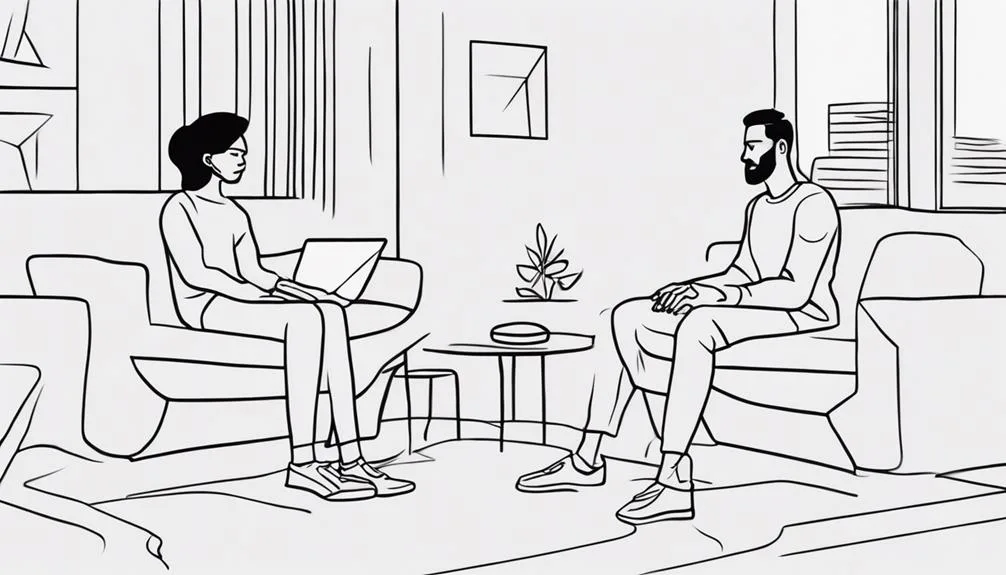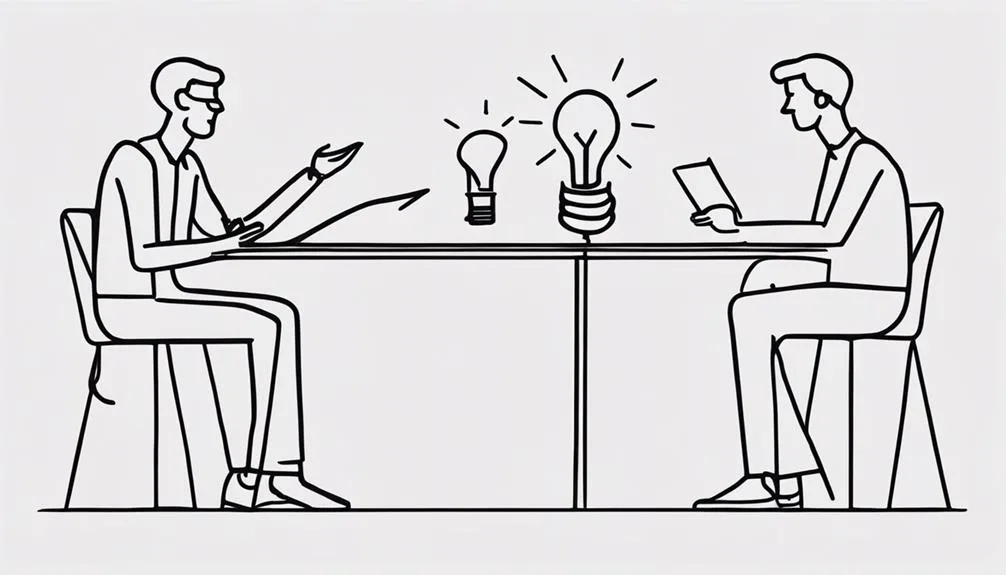Good communication can really change your relationship for the better. Listening well means you get where your partner is coming from. Being clear about what you need stops a lot of arguments.
Also, showing you understand, keeping open body language, talking about your feelings without blaming, giving helpful feedback, and having regular chats can make a big difference. These steps help you both get closer and understand each other better.
Key Takeaways
- Use 'I' statements and clear communication to express needs and feelings without assumptions.
- Practice active listening and empathy to fully understand and validate your partner's perspective.
- Maintain open body language and provide constructive feedback to foster a supportive environment.
- Schedule regular check-ins and turn off distractions to ensure ongoing, effective communication.
Practice Active Listening

Active listening isn't just hearing words; it's fully engaging with what your partner says to understand their perspective deeply. To do this effectively, you've got to avoid distractions. That means putting your phone away, turning off the TV, and making sure you're giving them your full attention.
It's not about waiting for your turn to speak, but truly hearing them out. Besides just understanding their words, it's vital to validate their emotions. Let them know you get how they're feeling, even if you don't necessarily agree with every point they're making.
Express Needs Clearly

While practicing active listening lays the foundation for understanding, it's equally important that you clearly express your own needs in the relationship. Communicating what you need from your partner without making assumptions can eliminate misunderstandings and foster a healthier connection. Start by identifying your needs and desires.
Once you're clear on what these are, articulate them to your partner in a straightforward and respectful manner. It's essential to avoid assumptions about what your partner knows or understands about your needs. Additionally, setting boundaries is a key aspect of expressing your needs. Clearly define what's acceptable and what isn't in the relationship, ensuring both you and your partner have a mutual understanding and respect for each other's limits.
This approach not only strengthens your bond but also promotes a culture of open and honest communication.
Show Empathy and Understanding

Empathy and understanding are essential elements in nurturing a deep connection with your partner. When you're in tune with their feelings, you pave the way for deeper emotional validation and perspective sharing. It's not just about hearing them out; it's about truly listening and putting yourself in their shoes.
| Emotional Validation | Perspective Sharing |
|---|---|
| Acknowledge their feelings | Look at the situation from their viewpoint |
| Confirm their emotions are valid | Share how you'd feel in their shoes |
| Don't rush to solve their problem | Discuss what you both can learn from this |
| Reassure them of your support | Explore how to prevent similar issues |
Maintain Open Body Language

Maintaining open body language can greatly improve communication in your relationship. When you're open in your physical demeanor, you signal that you're receptive and engaged. This doesn't just foster a sense of closeness; it encourages a more honest and flowing conversation between you and your partner. Remember, your body speaks volumes, often louder than your words.
Consider these key aspects of open body language:
- Eye contact: Maintaining eye contact shows you're focused and interested in what your partner is saying.
- Uncrossed arms and legs: This stance invites openness and suggests you're ready to listen without judgment.
- Physical proximity: Leaning in slightly or positioning yourself at an angle that faces your partner demonstrates you're fully present and engaged in the conversation.
Use “I” Statements

Beyond adopting open body language, it's also crucial to express yourself using 'I' statements to foster healthier communication in your relationship. By centering your discourse around your own experiences and feelings, you naturally avoid placing blame on your partner. This approach not only prevents defensive reactions but also promotes emotional honesty.
When you say, 'I feel,' instead of 'You make me feel,' you're taking ownership of your emotions and perspectives. This subtle shift in language can make a significant difference in how your message is received. It encourages a more empathetic and understanding response, paving the way for a more open and honest dialogue between you and your partner.
Give Constructive Feedback

When giving feedback, it's imperative to focus on being constructive and specific to help your partner understand your perspective without feeling criticized. Avoiding blame and using emotional intelligence are key in doing so. Here are some ways to make your feedback more effective:
- Focus on behaviors, not character. This helps in avoiding blame and encourages a more receptive response.
- Express how their actions make you feel. This taps into emotional intelligence by connecting actions with emotions.
- Suggest alternatives or solutions. This shows you're invested in finding a resolution, not just pointing out problems.
Schedule Regular Check-ins

Scheduling regular check-ins can greatly strengthen your relationship by guaranteeing ongoing communication and understanding. This means setting aside specific times to discuss how you're both feeling, what's working well, and what might need some adjustment. It's a proactive approach to avoid misunderstandings and guarantee you're both on the same page.
To make the most of these check-ins, aim for a digital disconnect. Turn off your phones and gadgets to give each other your full, uninterrupted attention. This shows you value the conversation and are fully present. By dedicating this time to each other, you're not only tackling issues before they become bigger problems but also reinforcing the importance of your relationship in your daily lives. Regular check-ins are a cornerstone of healthy communication.
Conclusion
Mastering the art of communication is crucial for the health and growth of any relationship. By embracing practices such as active listening, expressing needs clearly, demonstrating empathy, keeping an open posture, utilizing 'I' statements, providing constructive feedback, and committing to regular discussions, couples can significantly enhance their connection.
These strategies not only foster understanding but also encourage mutual growth. As you incorporate these techniques into your daily interactions, consider the transformative potential they hold for deepening your partnership.
What strides could your relationship make if both partners committed to these communication principles?

